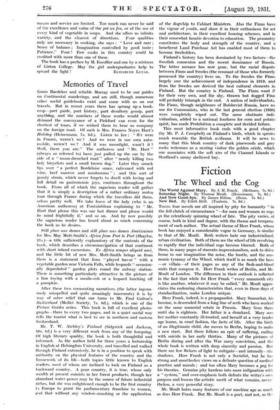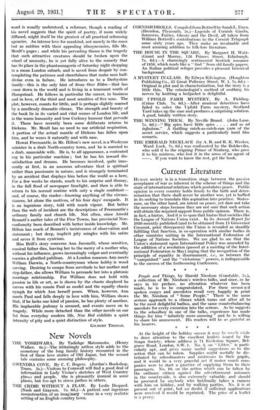Fiction
The Wheel and the Cog
THESE four novels are all inspired by pity for humanity "in the fell clutch of circumstance "—for men and women as cogs in the relentlessly spinning wheel of fate. The pity varies, of course, both in kind and degree, with the theme and tempera- ment of each author. The actual theme of Herr Frank, whose book has enjoyed a considerable vogue in Germany, is similar to that of Mr. Moult. Both writers hate our industrialized, urban civilization. Both of them see the wheel of life revolving so rapidly that the individual cogs become blurred. Both of them, in many pages of staccato impressionalism, seek to drive home to our imagination the noise, the hustle, and the eco- nomic tyranny of the Wheel, which itself is as much the hero —or villain—of their pages as any of the flesh-and-blood units that compose it. Herr Frank writes of Berlin, and Mr. Moult of London. The difference in their outlook is reflected in the fact that while for Herr Frank "every mammoth city is like another, whatever it may be called," Mr. Moult appre- ciates the endearing characteristics that, even in these days of standardization, make London unique.
Herr Frank, indeed, is a propagandist. Mary Szameitat, his heroine, is descended from a long line of serfs who have worked on the same manorial estate in Prussia. Mary lives there until she is eighteen. Her father is a drunkard. Mary sees her mother constantly ill-treated, and herself at a very tender age learns, in cruel fashion, the facts of life. After the birth of an illegitimate child, she moves to Berlin, hoping to make a new start. But there follows an epic of suffering, ending with suicide in her early thirties. Many of the pictures of Berlin during and after the War carry conviction, and the whole book is written with deep sincerity and passion. But there are few flickers of light to mitigate—and intensify—the shadows. Herr Frank is not only a Socialist, but he has strong and unorthodox views on a delicate question of medical practice and morals ; and too often Mary becomes a peg for his theories. Genuine pity hardens into mere indignation with a "system," and over-emphasis both defeats the writer's own purpose and lessens the artistic merit of what remains, never- theless, a very powerful story.
Mr. Moult hates many features of our machine age as much as does Herr Frank. But Mr. Moult is a poet, and not, as th3 word is usually understood, a reformer, though a reading of his novel suggests that the spirit of poetry, if more widely diffused, might itself be the greatest of all practical reforming agencies. An intense love for mankind, not merely in the mass but as entities with their appealing idiosyncrasies, fills Mr. Moult's pages ; and while his pervading theme is the tragedy that such attractive creatures should be broken upon the wheel of necessity, he is yet fully alive to the comedy that has its place in the phantasmagoria of Saturday night shopping in a mean London suburb, and is saved from despair by con- templating the patience and cheerfulness that make men half- divine even in failure. He introduces us to a Derbyshire family—this is the only hint of Snow Over Elden—that has come down in the world and is living in a tenement south of Hampstead. He follows in particular the career, in business and in love, of the third and most sensitive of five sons. The plot, however, counts for little, and is perhaps slightly marred by a needlessly dramatic climax. The strength and beauty of the book lie in its varied and vital scenes of London life, and in the warm humanity and true Cockney humour that pervade it. There have recently been some deliberate returns to Dickens. Mr. Moult has no need to use artificial respiration. A portion of the actual mantle of Dickens has fallen upon him, and he wears it naturally and with ease.
Howat Freemantle, in Mr. Hilton's new novel, is a Wesleyan minister in a drab North-country town, and he is married to a drab, unamiable wife. He is, to all appearance, a contented cog in his particular machine ; but he has his inward dis- satisfaction and dreams. He becomes involved, quite inno- cently at first, in an amorous adventure that is spiritual rather than passionate in nature, and is strangely terminated by an accident that displays him before the world as a hero, For a few weeks he stands, much to his surprise and dismay, in the full flood of newspaper limelight, and then is able to return to his normal routine with only a single confidant— and, of course, the reader—knowing anything of the circum- stances, let alone the motives, of his four days' escapade. It is an ingenious story, told with much vigour. But better than the web of incident are the descriptions of Freemantle's ordinary family and church life. Not often, since Arnold Bennett's earlier tales of the Five Towns, has provincial Non- conformity been described with better inside knowledge. Mr. Hilton has much of Bennett's incisiveness of observation and statement ; but deep, implicit pity mingles with his satire and saves it from cynicism.
Miss Brill's story concerns Ann Jaconelli, whose sensitive, musical father dies, leaving her to the mercy of a mother who, without his influence, grows increasingly vulgar and eventually marries a glorified publican. At a London museum Ann meets William Darwin, a North-countryman whose hobby is wood carving. Desiring to escape from servitude to her mother and step-father, she allows William to persuade her into a platonic marriage relationship. For William does not hold with passion in life or art, as is shown by the chaste shepherd he carves with his cousin Paul as model and the equally chaste nymph for which Ann herself poses. When, however, Ann meets Paul and falls deeply in love with him, William shows that, if he lacks one kind of passion, he has plenty of another. His implacable jealousy is aroused, and events move on to tragedy. While more detached than the other novels on our list from everyday modern life, New Bed exhibits a quiet intensity of pity and a quiet distinction of style.
GILBERT THOMAS.



























 Previous page
Previous page